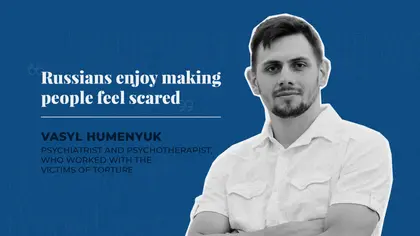A local psychiatrist and psychotherapist has said that many victims of sexual and other violence committed by invading Russians are finding it difficult to discuss what they went through. Speaking in an exclusive interview with Kyiv Post, Vasyl Humenyuk, who helped to conduct police interviews with victims in Kherson and Kyiv Region, explained that many are still traumatized and feel shame or find it hard to talk. Sadistic Russians would torture victims even more if they did not show fear. He also described a harrowing case of sexual violence committed against a five year old girl.
What kind of violence did your patients face in Kherson?
JOIN US ON TELEGRAM
Follow our coverage of the war on the @Kyivpost_official.
I can't give out too much information, but what I can say is that most of the women captured by Russians experienced sexual violence in one form or another in torture chambers. It’s not necessarily rape - undressing or threats of rape also qualify as facts of sexual violence.
Everyone I talked to in the torture chambers had been tortured - electric shock, intimidation by shooting. People were kept in inhuman conditions.
According to those who faced such experiences - not all Russians are sadists. There are more or less sane and humane people among them. It is a certain policy on the part of the Russians, namely intimidation. Another interesting point is that if during interrogation you show that you are not afraid, they begin to beat and torture you even more. They enjoy it when a person is scared and shows obedience.

‘One of Moscow’s Biggest Defeats’ – Ukraine at War Update for Jan 2
The Russians took some prisoners from those torture chambers to the occupied territories. Some were released.
From what I know, the number of victims came to more than 100. There were several torture chambers in the city of Kherson, and people had bags put on their heads, and they couldn’t understand exactly they were.
Have you come across cases of violence against children?
Yes, I did in Kyiv Region. It involved a five year old girl. A female psychologist worked with her – as it was more appropriate in this case. The girl experienced sexual violence - it's a terrible story.
Can you describe the project that you’re working on?
The main area of my professional activity was domestic violence.
When the war began, sexual violence took place in the occupied territories. This topic is very much intertwined with domestic violence, so I began to work with it.
I work with the Andreev Family Foundation, which runs the Assisto project in unison with the Women for Women International organization, whose activities are aimed at helping women who have survived sexual violence from the Russian military.
For the third month in a row, we have been actively traveling around Kyiv Region, working on an individual basis and conducting group classes for women and children who were under occupation.
Our project has begun to cooperate with the Prosecutor-General's Office, as they are carrying out an investigation, so we went with them for a few days to Kherson as part of a field trip.
As a psychologist, I worked with victims and witnesses who experienced torture, including sexual violence.
Four psychologists are involved in the project at present and work with 20 people, including men. There are many more victims.
Most people are not ready to get in touch with psychologists, especially if these are people from small villages and they are afraid that someone will find out.
I understand them, and we cannot impose our help.
Most people perceive this experience as extreme humiliation of their dignity and self-esteem. A person can be left with trauma for life and may even try to commit suicide.
I also help investigators to select a more effective interviewing model because this is a rather delicate category.
When a person talks in detail about his or her traumatic experience, the threat exists of that person being traumatized again, which has its consequences.
The same applies to investigators who conduct interviews with this category of people.
There is such a thing as a trauma of compassion, when a person listening to the traumatic experience of another person can also be traumatized.
We work with law-enforcement agencies when we conduct these interviews with survivors, and by doing so they’re more effective and less traumatic for the police officers involved.
Why don’t victims of violence seek help - are they afraid of being judged?
People believe that everyone will laugh at them if they find out about it.
They are terrified of being condemned. They are ashamed.
Often, they are not even ready to talk about this experience with their relatives.
For those who seek help - it happens with the assistance of loved ones or when a person is in an extreme state.
Quite often this is post-traumatic stress disorder.
Such people have flashbacks when memories of such negative experiences are rekindled.
For example, when a person sees a military uniform, even a Ukrainian one, a bulletproof vest, or a machine gun, it all reminds them of traumatic experiences.
There is a crisis of life values, and a person does not believe that someone can help.
In general terms, sexual violence is considered a form of torture. Does our society condemn people who have been victims of sexual violence?
Society treats this experience with compassion, but one person out of a hundred can be skeptical or ironic. People themselves are sometimes cruel. Also, many people do not want to be pitied.
If a person still does not want to go to a psychologist, are there other ways of helping?
I want to appeal to all those who have been through violence, including sexual violence, which is present in large numbers.
I am making an impassioned appeal to victims to seek help from a psychotherapist.
If a person does not want to go to a psychotherapist, then they should at least not keep it inside. They need to have a person - a friend or relative - with whom they can share this with. Please do not keep it inside you or close inside yourself, but rather talk about those experiences.
You can also highlight the text and press Ctrl + Enter






